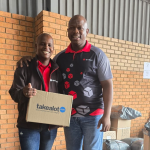In Progression’s 18 years of operation as a consulting company specialising in disability management in the workplace, we have observed an ever-increasing trend of companies opting to implement hosted projects where learners with disabilities are placed at a “host employer” for the practical component of their learnership. The vast majority of conversations we are having with our clients lately involve requests for learners with disabilities to be hosted externally, with some requiring guarantees of permanent employment at the end of the project. Over the last 6 months, 75% of the projects we have implemented have been for hosted learnerships.
Hosted learnerships allow organisations to enjoy all the scorecard benefits linked to disability without needing to see or interact with the learners. Although this hands-off approach may appeal to many employers, it is completely at odds with the intention and spirit of the B-BBEE Codes.
People with disabilities constitute the most disadvantaged target group in South Africa and have historically faced significant discrimination and been subjected to social and economic exclusion. According to Progression’s own statistics, based on a database of over 7000 candidates with disabilities, only 23.5% hold a Matric or equivalent and just 5.2% have a tertiary qualification. Fear, stigma and distorted perceptions, in general, serve to further entrench these prejudices and often represent the greatest barriers encountered by people with disabilities, even more so than the limitations caused by their actual condition. B-BBEE as well as Employment Equity legislation was introduced to address these inequalities by promoting integration into the South African workforce and driving meaningful transformation for people with disabilities. However, the hosted learnership model further perpetuates the segregation of people with disabilities as they are once again isolated and separated from the “non-disabled” employees.
A further scorecard incentive for companies is the 5 bonus absorption points that can be earned if the learners are taken into full-time employment at the end of the learnership contract period. It is interesting to note that employment does not necessarily have to be provided by the company claiming the points – if the learners are employed by any other employer, the original company is still eligible for the bonus points. Consequently, in addition to hosted learnerships, companies also tend to push for guarantees of permanent employment after the project in order to secure the additional absorption points.
Another challenge is attempting to meet Economically Active Population (EAP) targets through disability initiatives, as requested by many employers. This involves the alignment of learner numbers to the national targets of the Economically Active Population and requires targets to be broken down into specific criteria according to the different race sub-groups within the definition of Black, in accordance with the Employment Equity Act i.e. African, Coloured and Indian. Trying to fulfil these targets can prove to be tricky, bearing in mind that the employable number of people with disabilities, in general, constitutes only about 4% of the population of South Africa (as per the 2011 census figures provided by Stats SA) and that the large majority of this very small pool of people has limited to no work experience, limited education and a lack of self-confidence and social skills.
A further worrying phenomenon of late has been the concept of simulated working environments for learners to fulfil the practical component of their learnership. While simulated workplaces can be effective and useful in certain circumstances, and if implemented correctly, in many instances these replicated environments fall short in providing learners with the real-life, on-the-ground exposure necessary to adequately prepare them for the world of work. More often than not, these environments turn out to be nothing more than a façade to create the impression of productivity whereas, in reality, the learners are given little to no meaningful tasks to perform. Even more disturbing however is the unethical approach by some providers in the industry who offer learners no workplace experience at all. Many of the candidates interviewed by Progression have reported being enrolled on programmes where they receive a minimal amount of classroom training (usually one day per week) and then spend the remainder of the time sitting at home. This practice does not benefit the learners at all and results in a worthless qualification with no practical value. What’s more, it epitomises learner exploitation and completely undermines the objective and essence of skills development and learnerships. These scenarios are even more unscrupulous when they involve learners with disabilities, which they very frequently do.
For companies that are sincere in their desire to integrate people with disabilities and effect true transformation, the first step would be to create an accepting, educated and sensitised workforce. Changing the way in which disability is perceived in the organisation is a difficult but vital task in order to create a more diverse and inclusive workplace. Developing and implementing policies and procedures around disability in the workplace is also essential in managing people with disabilities and ensuring that adequate support structures are put in place. It is equally important to empower and equip HR staff to fully understand and effectively and sensitively deal with disability issues. These strategies greatly facilitate integration by ensuring that disability becomes hardwired into the culture and values of the organisation. The most important factor, however, is that disability integration should start at the top. CEOs and top management need to genuinely buy into the process and do it for the right reasons in order to effectively drive these principles down through the rest of the organisation.
When companies genuinely embrace Skills Development and the other elements of the B-BBEE scorecard as a means of true transformation, the results are exciting, the possibilities are endless and the opportunities are invaluable. It’s time to do the right thing – bring disability out of the shadows and recognise and acknowledge people with disabilities as productive, valuable and integrated members of the workforce and society. DM


















 Become an Insider
Become an Insider
Comments - Please login in order to comment.